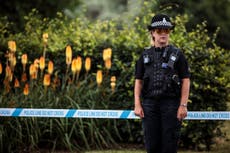The apparent poisoning of a couple in Amesbury comes at an unfortunate moment, just as the diplomatic turmoil caused by the nerve agent attack on Sergei and Yulia Skripal was beginning to ease – or, at least, had drifted down the list of media and public talking points. Anxiety about spies and chemical weapons had given way to World Cup hysteria: in a game of Mallett’s Mallet, “Russia” would in recent weeks be met with the response of “football”, rather than “novichok”.
Certainly it is an extraordinary turn of events, coming nearly four months after the attack which left the Skripals fighting for their lives. Having initially been cautious about drawing a link between that incident and the illness that struck down ️Charlie Rowley and Dawn Sturgess at the weekend, the police now appear convinced of a connection.
Indeed, the working hypothesis is that the unwitting couple – who had been in Salisbury prior to falling ill – somehow stumbled on the poison at the location where it had been prepared before the targeting of the Skripals, or where its residue had been discarded in the aftermath. On the face of it that feels like a perfectly plausible theory, especially when the background of the individuals affected at the weekend do not lend themselves to an alternative proposition that they were deliberate victims of a second attack.
Inevitably, though, conspiracy theories abound already. Just as there are plenty of people who do not believe the British government’s account of Russia’s involvement in the poisoning of Sergei and Yulia Skripal, so there are now sceptics who are raising red flags over the latest incident.
At the technical end of the scale are self-pronounced experts who contend that the symptoms reported to have been exhibited by Rowley and Sturgess (and, for that matter, the Skripals before them) are not the right fit for novichok poisoning. On the contrary, they say, the more likely explanation is that the pair were exposed to BZ, probably manufactured at the conveniently located Porton Down (which provides the organisational bogeyman for the disbelievers).
Doubts about the “official” narrative then play into the broader conspiracy favoured by online dissenters, which is that the British government – having been responsible for the Skripals’ “poisoning” (it may or may not have been a total scam, depending on which branch of the conspiracy you prefer) – is also behind the hospitalisation of Sturgess and Rowley.
The purported motive is to renew attention on Russia’s supposed involvement in the Skripals case in order to dilute the soft power victory provided by its hosting of the World Cup (or alternatively to distract attention from Brexit). Taken to its most extreme version, this extraordinary idea effectively accuses the British state of deliberately poisoning UK citizens in order to further a propaganda campaign against the Kremlin.
Even if you do not feel comfortable with the notion that the Russian state carried out the attack on the Skripals, these contrary propositions are absurd – but they are dangerous because they gain ground in an online environment that is contemptuous of officialdom, that delights in the most outlandish conspiracies, and that is actively nurtured by shadowy and malevolent state forces. In the absence of culprits being caught in the act red-handed, and a written confession from Vladimir Putin himself, the conspiracy theorists will continue to promulgate their nonsense.
None of this is to say that the public should not hold governments and officials to account, whether in this country or anywhere else. But it is plainly wrong – especially in a nation such as Britain in which the rule of law is strong, corruption in official agencies is not endemic, and democracy functions effectively – to assume that everything that comes from the mouth of a politician or a police officer or a government spokesperson is a lie, or at best a half-truth.
Yet increasingly there is such a presumption of guilt from some sections of society. Worse still, it has been weaponised by politicians themselves – most notably of course by Donald Trump, who has built electoral success on the premise that truth is in the eye of the beholder and that volume is king. Totalitarianism develops through strength of purpose and character, not veracity (indeed it generally requires the suspension of previously accepted norms).
All this is why it is imperative not only to let law enforcement agencies get on with their investigations in Salisbury and Amesbury, but also to place trust in their expertise and in their explanations – not as an article of faith but on a realistic understanding of how Britain works: which is to say that it is not a hotbed of official venality, in which citizens are bumped off at random by agents working to discredit Russia or any other foreign state with which the government isn’t super pally.
The alternative is believing that the truth is to be found in the conspiratorial rabbit holes of the internet and in the mouths of men like Trump. We need to be better than that.





Join our commenting forum
Join thought-provoking conversations, follow other Independent readers and see their replies